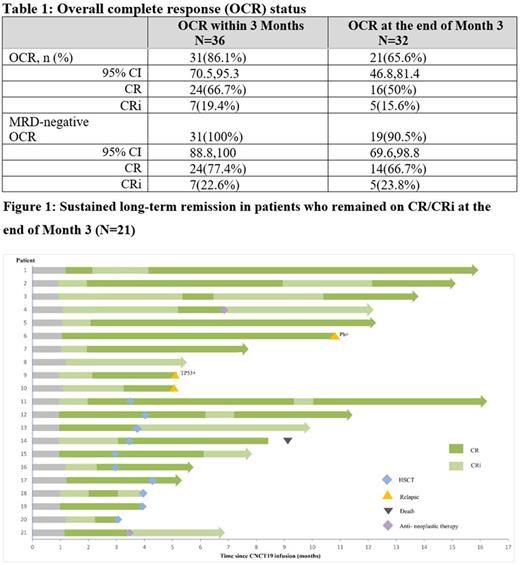Abstract
Background: Only 18-44% of adult patients with R/R B-Cell ALL achieve remission with median overall survival (OS) of 2 to 6 months after salvage chemotherapy. Blinatumomab and inotuzumab ozogamicin have been approved for their higher response rate, though outcome remains unsatisfied with a median OS of 7.7 months. Thus, adult R/R B-cell ALL has a highly unmet medical need for new and more effective treatment options.
CNCT19 (inaticabtagene autoleucel) is an autologous CD19-specific chimeric antigen receptor (CAR) T-cell product. The patent protected CAR structure of CNCT19 contains a unique CD19 scFv, HI19a, which is different from commonly used FMC63. Together with using 4-1BB co-stimulatory domain in the CAR structure, CNCT19 is expected to reduce the severity of treatment-associated cytokine release syndrome (CRS) and neurological toxicities (NT) while maintaining a stronger and longer durable anti-tumor effect. CNCT19 has been granted Breakthrough Therapy Designation by China National Medical Products Administration and Orphan Drug Designation by the U.S. FDA for the treatment of B-cell ALL.
Methods: The trial of CNCT19 in adult Chinese patients with R/R B-cell ALL (NCT04684147) is a single-arm, open-label pivotal study conducted at 10 centers in China. Patients underwent leukopheresis to obtain cells for CNCT19 manufacturing. CNCT19 was infused 2 to 14 days after lymphodepletion with cyclophosphamide and fludarabine. A single infusion of CNCT19 at a target dose of 0.5 × 108 (±20%) CAR+ viable T cells was administered. The primary endpoint was the overall complete response rate (OCR) of complete response (CR) and CR with incomplete hematological recovery (CRi) within 3 months and at the end of Month 3 after CNCT19 infusion by central assessment. The minimal residual disease (MRD) negative rate, duration of remission, relapse-free survival, and OS were assessed as secondary endpoints.
Results Patients
Of 53 patients enrolled and underwent leukopheresis, 36 were eligible for lymphodepletion and received CNCT19 treatment. CNCT19 was manufactured using serum-free culture system at Juventas GMP facility and no manufacture failure was reported. All 36 patients diagnosed with B-cell ALL were refractory (83.3%) and relapsed (16.7%) to multiple lines of prior therapy (83% patients had received 2 or more therapies). Twenty-one patients (58.3%) had more than 50% blasts in the bone marrow. Seven patients (19.4%) received hematopoietic stem cell transplantation (HSCT). Notably, 22 patients (61%) had high-risk cytogenetic abnormalities and somatic genetic mutations, including Ph+, TP53, 11q23/MLL, IKZF1, and E2A-PBX1 alteration.
Efficacy (Table 1)
OCR within 3 Months: Among the 36 patients, 31 (86.1%) had reached MRD-negative OCR within 3 months after CNCT19 infusion, including 24 patients (66.7%) with CR and 7 (19.4%) with CRi. The median duration of remission and OS have not been reached.
OCR at the end of Month 3: Of the 32 patients who were evaluable at the end of Month 3 after CNCT19 infusion, 21 patients (65.6%) remained on CR (50%) or CRi (15.6%). These patients had sustained long-term remission regardless of whether subsequent allo-HSCT treatment was done or not. Among them, 6 patients were in ongoing remission for over 12 months, and the longest duration of remission without any other subsequent anti-cancer therapy has surpassed 15 months with persistently detectable CNCT19 in blood. (Figure 1)
Safety The most common CNCT19-related adverse events (AEs) were CRS and NT and there were 3 cases of Grade ≥ 3 CRS (n=3, 8.3%) and 3 cases of Grade ≥ 3 NT (n=3, 8.3%). Following CNCT19 infusion, all the patients recovered. No death cases were reported due to CRS or NT.
Conclusions CNCT19 CAR-T cell therapy achieved a high rate of MRD-negative complete remission in adult patients with R/R B-cell ALL. The OCR within 3 Months and OCR at the end of Month 3 were 86.1% and 65.6%, respectively. The patients remaining on the CR/CRi at the end of Month 3 had a long duration of remission. While CAR T-cell treatment-associated AEs were reported in most patients, a comprehensive medical team to monitor and manage the patients significantly decreased the severity of treatment-related AEs. Thus, with its distinct CAR structure containing a unique CD19 scFv (HI19a), CNCT19 provides effective treatment with potential long-term clinical benefits for adult patients with R/R B-cell ALL.
Disclosures
Wang:AstraZeneca: Consultancy; Abbvie: Consultancy, Membership on an entity's Board of Directors or advisory committees.
Author notes
Asterisk with author names denotes non-ASH members.


This feature is available to Subscribers Only
Sign In or Create an Account Close Modal